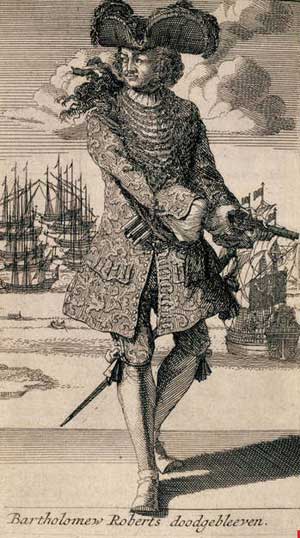Pirate mythology. Some true, some pure fiction, but all running along the same vein. The outlaw and the thief; the cunning adversary who dominates the open sea. The appeal of pirates may seem fanciful to some, or even grossly misguided and misinformed. These were the purest of criminals, after all, and what they now call the “Golden Age” of piracy (1690-1725) was short-lived and abruptly ended. Hardly a thing to be romanticized or emulated.
However, in the tradition of hunters and farmers, the pirate is the ultimate hunter; he is the anthesis to a domestic, predictable, mundane life.
“In an honest service there is thin commons, low wages, and hard labor; in this, plenty and satiety, pleasureand ease, liberty and power; and who would not balance creditor on this side, when all the hazard that is run for it, at worst, is only a sour look or two at choking. No, a merry life and a short one, shall be my motto.”
“Black Bart” Roberts
The dragon, who is also by nature a hunter and not a farmer, will invariably feel a deep archetypal draw to other hunters — and the pirate is no exception to that rule.
According to the principals of Jungian psychology, the recognition of an archetype is instinctive and primal — as they exist both in the mythology of the collective conscious and deep within our own unconscious minds. Therefore, by exploring the ways in which an archetype is defined by the broader accepted reality, while drawing forth an understanding of those mirrored qualities which are already deeply embedded within oneself, a person can work toward unifying their conscious reality with their unconscious experience. This process brings us closer to the goal of recognizing the purity of who we actually are, the self, independent and free from the corruption of the ego.
What, then, is a pirate?
According to the mythology derived from history and imagination, a pirate (also known as a corsair or buccaneer) is an individual who lives outside the law, not bound by (or loyal to) any country or land; a rogue of the sea. The important thing to note about a pirate here is not that he is breaking the law, but rather that he lives and dies beyond its limited boundaries. That a ship on the ocean is “not just a keel and a hull and a deck and sails”, which is nothing greater than the sum total of its required parts; it’s freedom. Likewise, a pirate himself, and a dragon too, is not merely defined by what he is, but by what he can do.
When it comes to the actions of a pirate, there’s a very clear focus on unscrupulously acquired wealth, either by force or at the end of a fanciful quest for buried treasure. A pirate funds his lifestyle of perpetual freedom this way, thus making the goal to acquire wealth more significant than something motivated by social standing or significance. In theory, it isn’t the gold itself that’s the prize, it’s the continued ability to live a pirate’s life. Although, historically, there were several famous opportunists who accumulated more wealth than they needed, for reasons far less straightforward than freedom and independence. But for the sake of the archetype and its appeal, the ‘treasure’ aspect truly is an extension of the freedom of the sea, and the method by which it’s feasible.
While the pirate is undeniably imbedded in our culture, often offering an imagined remedy for a general dissatisfaction with life and/or a wistful longing for adventure and escape, as an archetypal method of self exploration and revelation, he is so much more. A pirate symbolically exemplifies all that is unconstrained, and pointedly artful; he speaks to those who are not bound by convention, and prize freedom of the mind, body, and soul.


Doli January 9, 2016 at 11:43 pm
I really love this. It offers a whole new perspective on what a pirate is and what he stands for. But with such great qualities, why shouldn’t it be a thing to emulate? One might not literally become a criminal, raiding ships and towns, but is living an artful life with these principles of freedom and exploration, unbounded by convention and rules, such a bad thing?